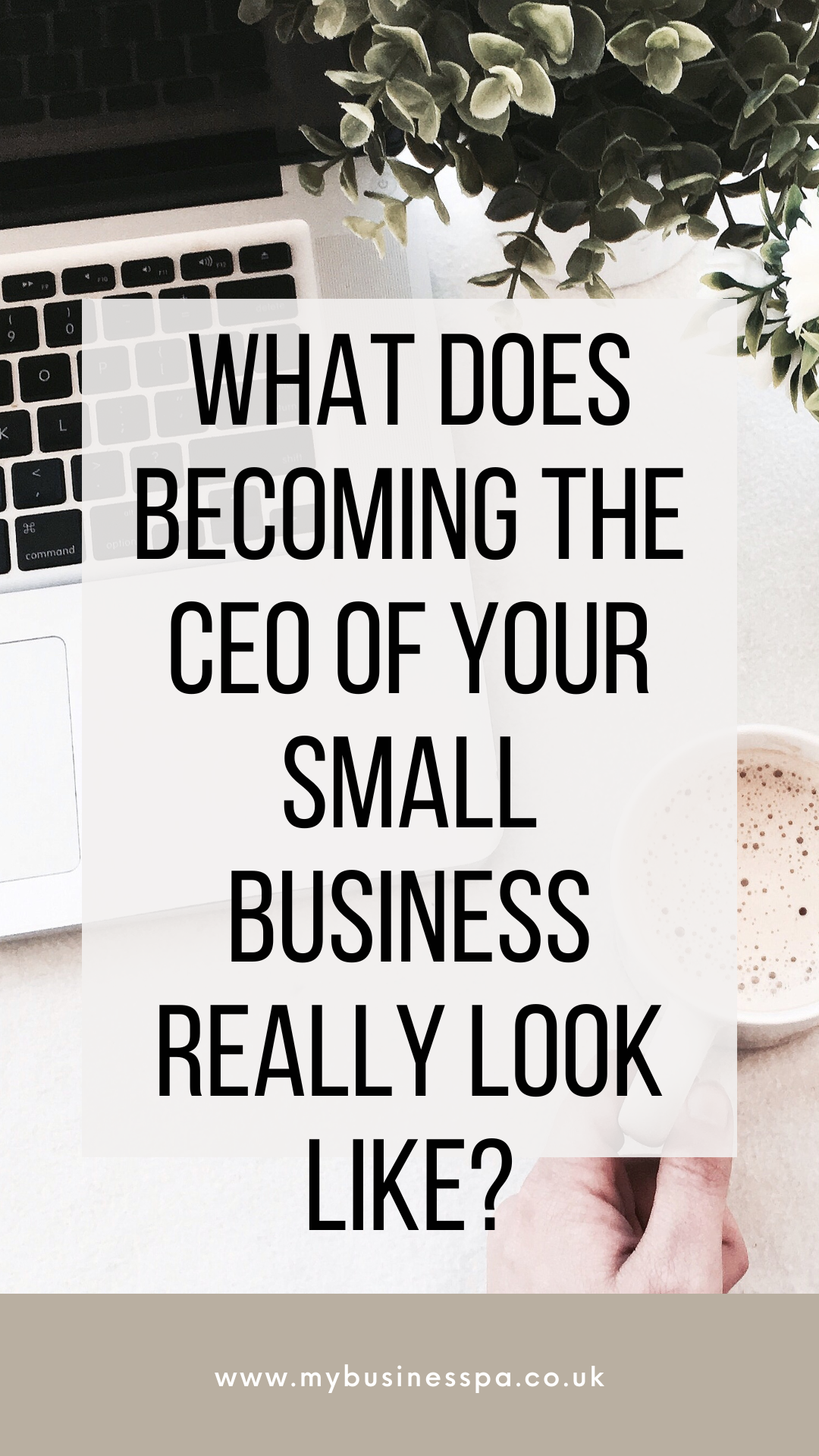Let’s face it, being the CEO of your small business isn’t going to look like 18 holes of golf, long boozy ‘business’ lunches, followed by brandy and cigars at the club while someone else runs the show behind the scenes.
That old-school, stereotypical image of a CEO feels world, if not galaxy, away from the daily life of a small business owner. You’re more likely to be found juggling client work, replying to emails, managing your team (even if it’s just a part-time VA), updating your website, and trying to remember if you actually ate lunch today.
So when you hear phrases like “step into your CEO role,” it can feel a bit… well, out of reach. Like a nice idea, but not something that really applies to you.
Because let’s be honest, who has time to swan about “being the visionary” when you’re still trying to remember which folder your client onboarding checklist is saved in?
But here’s the truth: becoming the CEO of your small business isn’t just a fluffy phrase or a corporate fantasy. It’s a powerful mindset shift and a practical way to finally create a business that feels structured, sustainable, and actually scalable.
And more importantly? It’s how you start taking your business seriously. It’s the shift that moves you from hobby mode to real business ownership. Because at some point, we all reach that crossroads where we have to decide: am I just winging it? Or am I actually building something that’s built to last?
So let’s explore what being the CEO of your small (or micro) business really looks like and why it might just be the most impactful thing you ever do for yourself and your business.

First up—what is a CEO, really?
Let’s strip it right back.
A CEO (Chief Executive Officer) is traditionally the highest-ranking executive in a business. Their role is to:
- Set the company vision and strategic direction
- Make key business decisions
- Oversee overall operations and performance
- Lead the team and delegate responsibilities
- Ensure the business is growing and moving forward
Sounds fancy, doesn’t it? But here’s what that actually means when you’re a team of one (or just a few):
Being the CEO of your small business means working on your business, not just in it.
It means stepping out of that never-ending to-do list and lifting your head up to look at the bigger picture. It means setting direction, building structure, making space for growth and making decisions that don’t just keep things ticking over, but move things forward in a meaningful way.
And if you’re serious about building a business that’s profitable, professional, and future-proof, this shift is essential.
What does being a small business CEO actually look like?
No golf. No cigars. But plenty of clarity, confidence, and control.
Here’s what it might look like in real life:
Why does stepping into your CEO role matter so much?
Because without it, everything stays stuck in your head.
And when everything lives in your head, you become the bottleneck. Nothing moves without your input. You can’t delegate properly. You’re constantly reacting instead of proactively driving the business. You’re busy but not necessarily progressing.
Sound familiar?
And here’s the other side of it: without stepping into your CEO role, it’s all too easy to stay stuck in hobby mode.
Where everything feels ad-hoc. Where your business runs on default instead of direction. Where you’re always rushing, rarely reflecting and your growth feels accidental, not intentional.
Stepping into your CEO role is about taking your business seriously. It’s about professionalising the way you operate so your business can grow beyond you and be seen and respected as the powerful, valuable thing it is.
Here’s what it changes:
From Hobby Business to CEO-Led Business
It doesn’t matter how small your business is, if you want it to thrive, it needs to be treated like a real business.
That means moving beyond just delivering the work, and starting to run the business like a leader.
That’s the difference between a business that burns you out… and one that builds long-term success.
The CEO role is what helps you move from chaos to clarity. From chasing your tail to having a clear direction. From a business that looks successful on the outside but feels messy on the inside… to one that’s structured, scalable, and taken seriously by both you and your clients.
So how do you actually step into your CEO role?
The good news, it doesn’t require a fancy title or a corner office. You can start stepping into your CEO role with small, intentional actions. Here are some practical ways to begin:
1. Block CEO Time into Your Calendar
Start small – just one hour a week where you stop doing client work and start working on your business. Use it to review your numbers, plan your week, assess your goals, or refine your systems. Treat it like a non-negotiable meeting with the most important person in your business…you.
2. Define Your Vision
Where is your business going? What kind of life do you want it to support? What kind of clients do you want to serve? Getting clear on your vision helps you make better decisions and stop saying yes to things that don’t align.
3. Get Systems Out of Your Head
If everything lives in your head, you’ll never be free. Start documenting your processes, even if it’s just in a Google Doc or a Loom video. You don’t need to go full corporate SOP (yet) but a few simple steps written down can be transformational.
4. Start Delegating (Properly)
If you have a VA or any kind of support, make sure you’re not just offloading tasks, but empowering them with systems, clear expectations, and decision-making guidelines.
5. Review and Reflect Regularly
Monthly/ quarterly and annual CEO check-ins can help you stay on track. Review what’s working, what’s not, and what needs tweaking. Your business doesn’t need to run perfectly but it should evolve with intention.
Being a CEO doesn’t mean doing more. It means doing the right things.
You don’t need to hustle harder or work longer hours to become the CEO of your business. In fact, the opposite is true.
You need to focus on the right activities, the ones that create real momentum, sustainability, and breathing space.
You need to think ahead, not just keep up.
You need to build systems and structure that support you, not stretch you.
You need to design a business that serves you, not one that leaves you drowning in client work while your dreams sit on the back burner.
If the idea of being the CEO of your small business feels a bit intimidating, know this: you’re probably already doing more of it than you think.
Every time you decide to raise your prices, improve your systems, plan your next launch, or invest in support, you’re already stepping into that CEO role.
You don’t have to do it perfectly. You just have to start.
And if you’re ready to take the first step, I’ve got something to help.
Grab my free Process Mapping Tool HERE and start getting those systems out of your head and into action. Because the sooner you step into your CEO role, the sooner your business will start working for you, not just because of you.
How a Certified Online Business Manager can help: The Business Owners strategic partner
As an Online Business Manager and Business Systems & Tech Strategist, I can review your business requirements and goals and implement systems and tools that will grow with you as your business grows. Implementing strategic systems and tools will save you time, energy and headspace as well as create an exceptional experience for your clients.
If you feel like your business could benefit from strategic systems and tools to streamline your business operations and free you up to focus on other things, please feel free to contact me for a free, no obligation call to see how I can help.
5 Essential Strategies for Managing Your Small Business
If you are struggling with the challenges of managing your small business then these 5 essential strategies for managing your business will help you get on top of this...
6 Powerhouse Strategies to Elevate Your Business Growth in 2024
If growing your business in 2024 is high on your agenda, these 6 powerhouse strategies will help you achieve this...
Online Business Manager vs Virtual Assistant – what’s the difference?
What's the difference between an online business manager and a virtual assistant? Both are virtual but there is a significant difference between the two to both you and your business...




